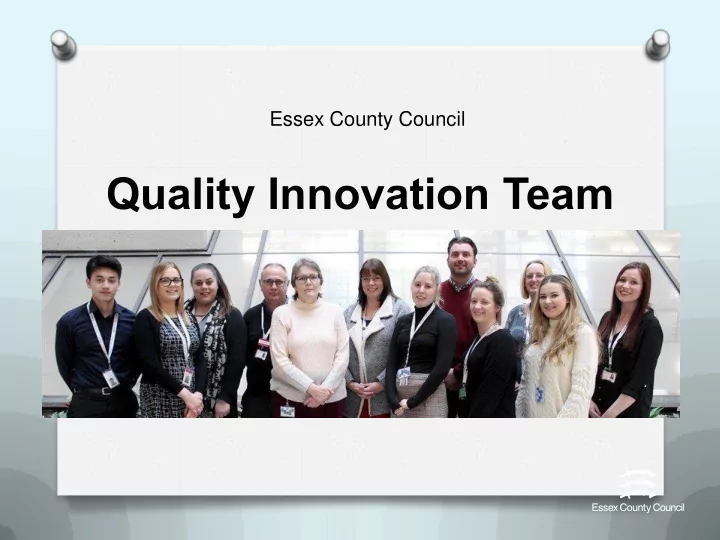

Essex County Council Quality Innovation Team
What do we do Using CQC reports and the ADASS auditing tool we look at themes and trends within adult social care provision and develop resources designed to address needs and improve quality within regulated services including residential and nursing care , domiciliary services and supported living. Identified gaps in quality have included O Medication management O Dementia O End of Life care O Inclusive Communication O Learning Disability with Mental Health needs O Falls O Nutrition & Hydration O Pressure areas O Sepsis O Nursing skills
How we do this Where ever possible we work with colleagues in health or develop our own learning. On occasions we will engage with external consultants to deliver the right learning experience for the adult social care market. O Workshops O Train the Trainer courses O Cascade training O Champions days O Community of practice O Conferences O Virtual experiences (VDT/ARE/GERT)
What does that include • PROSPER for older people • Various Train the Trainer & residential services cascade training where the provider is trained up to deliver • PROSPER for adults with training to their staff team disabilities services including • GERT suit training-1750 people • Oral health - to date 413 trained- of those1400 are domiciliary carers trained in oral residential care staff health • My Home Life • Inclusive Communication- 27 • Dementia Leadership licensed IC trainers • Virtual Dementia Tour • Dementia TtT- 61 homes • Autism Reality Experience • Parkinsons TtT- new • CPD conference for nurses • End of Life- Working with • Activity workshops hospices- new • Sensory Training • Bariatric care TtT 20 Dom care staff.
• • The PROSPER project is In May 2018 we launched successfully working with OP PROSPER for AWD services residential and nursing homes in including supported living. Essex to reduce the number of • The methodology is the same falls, pressure ulcers and UTI’s but the focus for AWD is on through the use of Quality reducing falls, understanding Improvement methodology, not dementia and on Diet & only improving system Digestion. performance and professional • We included Diet & Digestion as development, but also changing a way of addressing weight behaviours, encouraging creative management and more thinking to tackle the problems importantly the issue of and then using measurement to constipation. guide improvement.
Dementia Train the Trainer
Virtual Dementia Tour Key findings How effective was the Virtual How do you intend to change your approach Dementia tour at improving the in the following areas because of the Virtual 1.45 1.21 following - Dementia tour of participants 90% rated the 1.40 1.20 1 Strongly agree workshop as very 1 A great deal 2 Agree good overall 2 To some extent 3 Disagree 1.35 1.20 3 Not much 4 Strongly disagree 4 Not at all of participants had 1.30 1.19 more insight into 81.9% what it might be 1.25 1.19 like to live with dementia 1.20 1.18 of participants 1.15 1.18 would take into life 79.7% history when 1.10 1.17 supporting people Communication Physical Behaviours Life history Other changes Insight Understanding Support Communication with dementia Environment
VDT Two month survey • Changes in communication • Make sure I have eye contact before speaking. Speaking in a lower calm tone. Don't give more than one instruction at a time and give time to process. My facial expression is soft and open. • Ensure I stand directly in front of someone but not over them. I speak more slowly and clearly • With what I was shown and experienced at the VDT the changes I have made are mainly in response to the client.1.Getting the persons attention before I speak. 2. To only say what is relevant rather than using lots of words when in conversation . • Changes to physical environment • Keeping entrances and floor space clear. I have found items of red to help clients distinguish and recognise areas they find hard to see • Definitely thought about noise levels simple things like turning volume down on TV • If the people are being loud I remind them that this could trigger behaviours and ask them to quieten down or I will invite the person to accompany me to a quieter room. Use brightly coloured cups instead of white ones.
Sensory training How effective was the sensory awareness training of people have a better awareness of what it might 100.0% at improving the understanding in - be like to live with a sensory impairment 1.25 1 Strongly agree 2 Agree 3 Disagree 1.20 4 Strongly disagree of people feel more 1.15 100.0% confident supporting someone who has a 1.10 sensory impairment 1.05 1.00 of people have gained 0.95 knowledge/skills that will 100.0% What it is like to Understanding the How to overcome Supporting people Gaining new improve the way they have a sensory challenges challenges living with knowledge and skills support someone with a impairment impairments sensory impairment
To sum it up • Our support is based on evidence of need • It is intended for all regulatory Adult Social Care services • It encourages partnership working with health colleagues • It strengthens providers own resources. It creates networks of ‘trained’ staff who can cascade knowledge • • It aids in improving quality within services • It has a proven positive effect on culture within care services.
Where to find us O https://www.livingwellessex.org/events- provider-hub/forthcoming-events-and- training/ O Quality.innovation@essex.gov.uk
Recommend
More recommend